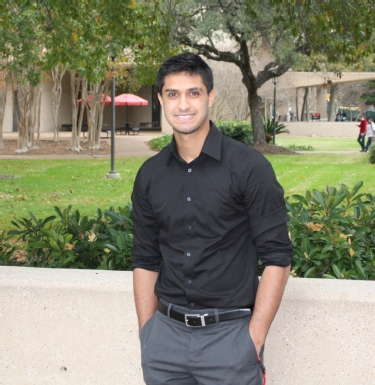Scholar Spotlight
Waqaar Diwan: Discovering the Value of Research
In his first year of college, Waqaar Diwan, business major and biology minor, was determined to focus on his studies and adjust to life at the University of Houston, “I had just started college, my goal was to get all A’s, I didn’t care about anything else.” But that sentiment changed when he sat down and talked about his interests with Dr. Veronique Tran, the coordinator of the Tier One Scholars program, at one of her Coffee Chats, “she encouraged me and she explained to us that if we did it, the faculty mentors would be understanding and work with our schedule.” So Waqaar, a business major with a sincere interest in health and medicine, made an appointment with Karen Weber, the director of the Office of Undergraduate Research, to meet with her and find opportunities for on-campus research.
Ms. Weber discussed multiple opportunities for mentored research, “but Optometry stood out to me,” Waqaar says. “I didn’t have any interest in becoming an optometrist, but I am interested in the eye, and I thought maybe I could get a better understanding of it.”
Waqaar met with Dr. Heidi Hofer, an assistant professor in the College of Optometry, and immediately, he says, he became intimidated. “She talked about all these things about the eye, rods and cones and so much detail about the eye… and she handed me a book and said that I was going to need to read and understand this.” He had brought a friend with him and as he left Dr. Hofer’s office his friend quipped, “Wow, you already have homework!”
As time progressed, Waqaar learned to love the work he was doing in the lab. He developed a sophisticated understanding of the problem he was researching. The goal of the research was to investigate spatial and color mechanisms of cone vision at 1.5 degrees from the fovea. He concluded that many factors affect the validity of data recorded including eyesight, amount of rest, food eaten prior to the experiment, as well as the effect of the rods on cone vision.
He learned invaluable technical knowledge by being exposed to high-tech equipment and research methods. Most importantly, he was able to develop relationships with graduate and post-doctoral researchers who helped him understand the rewards of discovery.“I learned [from one optometrist who had left the field to pursue research] that it wasn’t about how much money you make, but about the thirst for knowledge. If you are willing to quench your thirst for knowledge, you’ll be a lot more content and happier with your life.”

Waqaar’s drive to quench his thirst for knowledge is evident. Aside from being a high-achieving student, he was an athlete in high school, and continues to participate in intramural sports at UH. He is focused and determined to be a well-rounded person, “I’m not satisfied with just sitting in my room and studying, I want to workout, hang out with my friends, play sports. I want to be able to enjoy my time. I don’t want to be thirty years old and graduating med school realizing that I haven’t experienced everything I could.”
His drive comes from, first and foremost, his parents. “They have always supported me,” he says, “My mom is always pushing me, saying I can do better. My dad is always saying not to worry, that they’re proud of me.” His father came to America from Pakistan at the age of 16 to pursue an education. He studied engineering at UH and worked every day to support himself through school, sometimes getting only few hours of sleep at night. “When I’m discouraged, I look at my dad and everything he had to go through, everything he had to deal with to pursue his passion in engineering. It makes me say to myself that what I’m doing isn’t nearly as tough as what he went through. It encourages me to work harder and get through my challenge.”
Waqaar seems to be meeting those challenges head-on. Dr. Hofer, his research mentor, was impressed that even as a freshman, “Waqaar demonstrated considerable dedication and perseverance through this process, especially considering that he also had to balance his other academic work…. He is a quick learner, easily reaches out to other people when he doesn't get or understand something, and seems to have a good knack for finding the relevance in a given situation.”
In the future, Waqaar would like to follow the example of his family’s charitable activities, Waqaar hopes that his career will enable him to support non-profit work and make charitable contributions, “Seeing people that have less than the things I have been blessed with really inspires me to push myself to get to the top. I hope that one day I can reach a point in my life where I can make significant philanthropic impacts in the lives of others.”
Being a beneficiary of the Manny Family UH Tier One Scholarship Endowment has also inspired him to “one day start a scholarship of my own to sponsor another person’s education and give others the same opportunities the University of Houston and the Tier One scholarship have given me.”